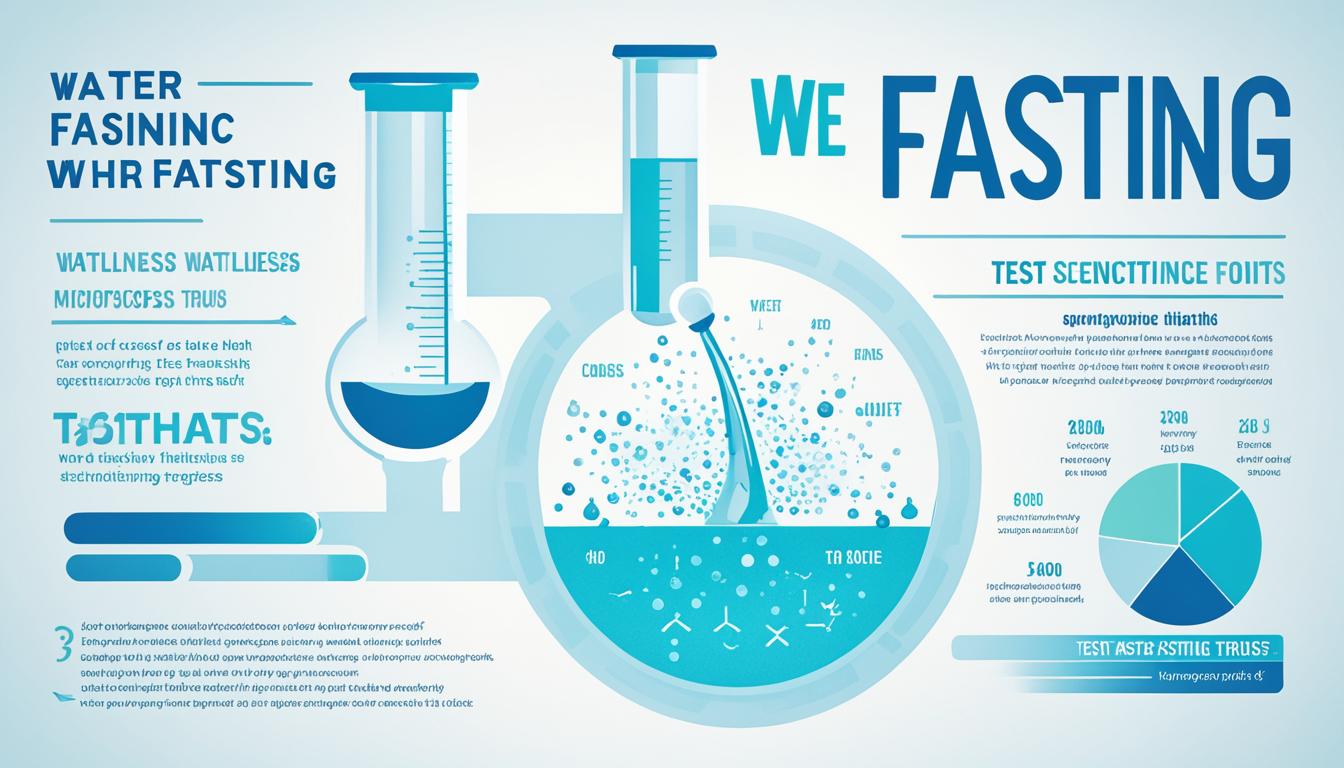Recent Scientific Research on Water Fasting has uncovered new insights into how it affects our health. The latest Water Fasting Research Updates show how our bodies change in many ways. These changes suggest that Health Benefits of Water Fasting go beyond just losing weight.
A key study at the Precision Healthcare University Research Institute and the Norwegian School of Sports Sciences is behind this new knowledge. Volunteers fasted for seven days, letting scientists study changes in their bodies. They looked at how proteins in the body changed during this time.
Key Takeaways
- A marked difference in body response is typically observed after the third day of water fasting.
- Participants often exhibit a significant reduction in weight, primarily lean mass, during extended fasts.
- Improved markers such as blood pressure and cholesterol levels tend to revert post-fasting.
- Close monitoring suggests Type 1 and Type 2 diabetes patients may fast safely with appropriate precautions.
- Fasting causes an increase in arachidonic acid, which could play a role in reducing inflammatory responses.
- Metabolic changes return to baseline after resuming a regular diet, indicating the temporary nature of fasting-induced modifications.
The Science Behind Water Fasting and Organ Response
Recent studies have shown how water fasting changes our bodies in big ways. It’s not just about losing weight. It also affects how our organs work and keeps us healthy.
Systematic Changes Across Multiple Organs
A study with 12 healthy people who fasted for seven days showed big changes. About 3,000 proteins changed in important organs. Some of these proteins help brain cells work better.
These changes started around the third day of fasting. This shows how our bodies start to adapt in a big way.
Evidence of Health Benefits Beyond Weight Loss
Water fasting does more than help with weight loss. It also lowers blood sugar and cholesterol levels. It starts a process called autophagy, which helps prevent aging and diseases.
It can also lower blood pressure in people with high blood pressure. This shows it has many health benefits.
Markers of a Whole-Body Response to Calorie Restriction
Water fasting makes our bodies react to not getting enough calories. Studies from places like Queen Mary University of London show this. It changes how our bodies work, not just our weight.
Studies in 2023 showed that fasting changes our bodies in big ways. It changes our body and biochemistry. This shows fasting could be good for health and we need more studies to learn more.
Exploring the Health Benefits of Water Fasting
Water fasting is more than a trend; it’s a scientifically proven way to improve health. Studies show it can help reduce inflammation and aid in cell repair. This makes it a powerful tool for better health.
When you fast, your body starts a complex process that brings many benefits. One key effect is autophagy, where cells clean out damaged parts. This boosts cell function and can extend life.
Research highlights the rise of arachidonic acid during fasting. This fatty acid helps lower inflammation, which is linked to many chronic diseases. It also affects the immune system, reducing inflammation.
| Effect | Mechanism | Health Benefit |
|---|---|---|
| Increased Arachidonic Acid | Inhibits NLRP3 Inflammasome | Reduction in Chronic Inflammation |
| Initiation of Autophagy | Cellular Cleansing | Enhanced Cellular Repair and Longevity |
| Ketosis | Metabolic Shift from Glucose to Fat | Weight Loss and Improved Insulin Sensitivity |
Water fasting also leads to ketosis, which helps with weight loss and improves insulin sensitivity. This, along with detox and mental clarity, shows the wide range of benefits.
As more people and doctors look into water fasting, it’s key to know the benefits and safety tips. Staying hydrated and getting medical advice before fasting is crucial. This ensures safety and helps get the most health benefits.
By exploring Scientific Research on Water Fasting, we gain insights and practical advice. This helps us use fasting safely and effectively to enjoy its many benefits.
Scientific Research on Water Fasting: Latest Findings and Insights
In recent years, Water Fasting Studies Analysis has made big strides. Thanks to new tech and detailed genetic maps, scientists can now see how fasting changes our bodies at a molecular level.
Latest Technological Advancements in Fasting Studies
Now, modern tech in Fasting Studies lets researchers track about 3,000 proteins in the body during a fast. This shows how each protein affects our health. It also reveals which biological pathways are turned on or off when we switch from eating to fasting.
This deep look at proteins shows fasting’s big health benefits, not just for losing weight. It could improve overall health. Such detailed studies are made possible by advanced analytical tools now used in fasting research.
Integrating Genetic Information for Predicting Health Outcomes
By adding genetic info to Water Fasting Studies Analysis, scientists can predict how fasting will affect people differently. This personalized approach aims to make fasting safer and more effective for everyone.
It’s key to understand that fasting isn’t right for everyone. So, tech that customizes fasting plans based on genes is a big step forward. It makes fasting safer and more effective for each person.
Understanding the Effects of Water Fasting on Body Composition
Starting a water fast changes the body in big ways, especially how it finds energy when not eating for a long time. These changes help us see the Health Benefits of Water Fasting.
Shifts from Glucose to Fat as an Energy Source
Usually, our bodies use glucose from food as their main energy source. But when fasting with water, the body starts using fat instead. This switch helps with weight loss and makes cells healthier. Studies now show this shift is key to fasting’s effects.
Impact on Fat Mass and Lean Mass
When we look at body composition during fasting, we see less fat and lean muscle. Studies show people lost weight and their body mass index went down. This proves the Water Fasting Health Impacts on body shape.
Sustainability of Weight Loss Post-Fasting
How long weight loss from water fasting lasts is a big question. A 2022 study found fat loss stayed, but lean muscle came back quickly after eating normally again. This shows we need a good plan after fasting to keep the good effects.
Seeing the quick and lasting effects of water fasting gives us a full picture of its potential.
| Parameter | Before Fasting | After Fasting | Post-Fasting Maintenance |
|---|---|---|---|
| Weight | Varies | Decrease | Slight increase or stabilize |
| Fat Mass | Higher | Significant decrease | Low increase or stable |
| Lean Mass | Stable | Decrease | Rapid regain |
| Blood Pressure | Normal/High | Lower | Normal |
To learn more about this diet, check out detailed guides and studies. Look at the ultimate guide to water fasting for more info.
Historical and Cultural Context of Water Fasting
Water fasting has been a key part of many cultures and religions worldwide. It’s not just for spiritual or religious reasons but also for health. Studies show it can improve well-being.
Historically, water fasting was used to treat many health issues, like epilepsy and rheumatoid arthritis. Today, it’s used for health and weight loss. As we learn more about its benefits, it keeps evolving.
In ancient times, fasting was common and seen as a way to cleanse the spirit. In Christianity, it’s a sign of humility and a way to seek divine help. Jesus taught about self-denial, showing fasting’s deeper meaning.
Judaism also values fasting, with important days like Yom Kippur and Tisha B’Av. These fasts are spiritual and help the community reflect. They’re times of mourning or tragedy, seeking purification and redemption.
| Cultural Fasting Events | Durational Details | Purpose of Fasting |
|---|---|---|
| Yom Kippur (Judaism) | 25-hour total fast | Spiritual atonement, purification |
| Tisha B’Av (Judaism) | 25-hour total fast | Mourning the destruction of the First and Second Temples |
| Lent (Christianity) | 40 days, specifics vary | Preparation for Easter, humility, self-denial |
Today, people fast for health reasons, not just religious ones. Studies show it can help with physical and mental health. This shows how ancient wisdom and modern science come together.
Looking into fasting’s history and culture, we see a long history of practices. Each one adds to our understanding of this powerful way to improve health.
Debunking Myths: The Reality of Extended Water Fasting
Extended water fasting is becoming more popular, but it’s important to know what’s real and what’s not about its Effects of Water Fasting. While some people say it has big health benefits, experts have a more detailed view. They see both good and bad sides.
Lack of Conclusive Evidence on Health and Weight Loss
Many people talk about losing weight and feeling clean from fasting. But, there’s not enough solid proof that it works well for health and losing weight over time. Some studies show it can help with weight loss, but others warn of health risks like not getting enough nutrients and problems with metabolism.
The Potential Dangers of Prolonged Fasting Without Supervision
Fasting for a long time without a doctor’s watchful eye can be risky. You might feel bad, like headaches and cramps, or worse, like your heart racing and not having enough electrolytes. There’s also a big risk of getting sick after you start eating again if you’re not careful.
So, while water fasting might have some health perks if done right, it’s not without its dangers. If you’re thinking about trying it, talking to a doctor is key to stay safe and make sure it’s working for you.

Knowing the real deal about Effects of Water Fasting and Water Fasting Health Impacts helps people make smart choices for their health. It’s about finding a balance between quick fixes and taking care of your health for the long haul.
Intermittent Fasting: A Safer Alternative?
Intermittent Fasting focuses on when you eat, not what you eat. It’s a flexible way to improve health, offering many benefits. It’s seen as a safer and more lasting choice than long-term water fasting. Different types of this fasting show promising results.
Types of Intermittent Fasting and Their Flexibility
There are many ways to do intermittent fasting, fitting different lifestyles. You can eat only during a certain time each day or fast every other day. For example, eating for just six hours a day can lead to a 3% weight loss in 10 weeks.
Impact of Intermittent Fasting on Metabolism
Intermittent fasting can improve your metabolic health. A study found that people with type 2 diabetes lost weight by eating only during an eight-hour window. This method lowers fasting glucose and insulin, making it good for diabetes and obesity management.
But, it’s not right for everyone. It’s not good for kids, pregnant women, or those with certain health issues.
The Promise of Intermittent Fasting for Brain Health
Studies show that intermittent fasting can boost brain health and cognitive functions. Animal research has shown better memory and brain health. This suggests it could greatly improve life quality.
Yet, it’s important to be careful with intermittent fasting. Long fasting periods without proper nutrition can be harmful. Always talk to a healthcare provider before starting to make sure it’s right for you.
Patient Safety: Risks and Considerations for Water Fasting
Water fasting can help with insulin sensitivity and lower heart disease risk. But, it’s important to know the water fasting risks and health impacts of fasting. You should think carefully and get a doctor’s advice before starting.
One big risk is refeeding syndrome, a condition that happens when you eat too much too soon after fasting. To avoid this, it’s best to add calories back slowly. Fasting can also lead to not getting enough vitamins and minerals. It’s key to drink enough water, but even that doesn’t stop dehydration from happening.
People fasting often feel tired, dizzy, and have trouble focusing. These effects can make everyday tasks hard and affect your health.
Not following a fasting plan can lead to eating disorders or unhealthy eating habits after fasting. Remember, water fasting doesn’t fit with the USDA Dietary Guidelines. These guidelines suggest eating a balanced diet with different food groups for good health.
| Parameter | Pre-Fasting | Post-Fasting | 6-Week Follow-Up |
|---|---|---|---|
| Triglycerides Level | 150 mg/dL | 120 mg/dL | 130 mg/dL |
| Cholesterol Level | 220 mg/dL | 190 mg/dL | 200 mg/dL |
| Fatty Liver Index (FLI) | 60 | 50 | 55 |
It’s crucial to understand the health impacts of fasting before trying it. Getting a doctor’s guidance can help avoid the water fasting risks. This way, you can enjoy the benefits without the downsides.
Dietitian’s Corner: Guidance for Safe Fasting
When thinking about water fasting, it’s key to follow safe practices to stay healthy. Kaytee Hadley, a dietitian in functional medicine, says to talk to a healthcare provider before starting. This is especially true for the elderly, young people, and those with health issues.
Starting with shorter fasts is a good idea. Dr. Johannes Uys, an expert in nutrition, recommends starting with short fasts and then slowly increase the time. This approach reduces stress on the body and helps with metabolic health and autophagy, a natural cell cleaning process.
Water fasting is also good for heart health and making insulin more effective. Ro Huntriss, a dietitian, says to pay attention to staying hydrated and active while fasting. When ending a fast, she advises slowly adding foods back into your diet to avoid serious health issues.

| Type of Fasting | Benefits |
|---|---|
| Intermittent Fasting | Reduces lipid levels, improves insulin sensitivity, lowers blood pressure, reduces BMI. |
| Time-Restricted Fasting | Improves hormone function, aids in weight loss, enhances brain health. |
| Alternate-Day Fasting | Encourages significant weight loss, improves metabolic features. |
| Medically-Supervised Modified Fasting | Useful in treating hypertension, metabolic syndrome, chronic pain syndromes, and rheumatic diseases. |
To get the most from fasting, talk to experts to find the right method for you. While water fasting has many benefits, starting without guidance can be harmful.
Conclusion: Weighing the Evidence on Water Fasting
The study of Water Fasting Analysis is complex and full of details. Many Scientific Research on Fasting studies have been done. A recent study looked at 40 overweight and obese adults without diabetes. It found that fasting helped improve their health in many ways.
After fasting for about two weeks, these adults lost weight, reduced belly fat, and improved heart health markers. But, by six weeks later, some health markers went back to normal. Yet, others stayed better, showing fasting’s potential benefits.
Even though some people had mild side effects, there were no serious issues. With more people becoming obese worldwide, finding ways to help is crucial. Water fasting might be one solution, but it’s not safe without a doctor’s watchful eye.
Studies show that fasting can help with insulin resistance and other health issues. But, can people stick with it long-term? This is what scientists are still figuring out.
Water fasting mixes old traditions with new science. It could be good for health, but it’s not a one-size-fits-all solution. It’s important to talk to a doctor before trying it. Water fasting is more than just not eating; it’s a complex health strategy.
Source Links
- Water fasting’s metabolic benefits may be short-lived
- Cambridge scientists discover how fasting turns up the body’s natural inflammation fighter
- Exploring the effect of prolonged fasting on kynurenine pathway metabolites and stress markers in healthy male individuals – European Journal of Clinical Nutrition
- Study identifies multi-organ response to seven days without food
- What Is Water Fasting? Benefits, Risks And More
- 8 Health Benefits of Fasting, Backed by Science
- The benefits of water fasting: Achieve optimal health and wellness
- A single 36-h water-only fast vastly remodels the plasma lipidome
- 110 Hours of Insight: Unlocking the Power of Water Fasting and Ketosis
- Water Fasting: Weighing the Benefits and the Risks
- Effects of Fasting on the Physiological and Psychological Responses in Middle-Aged Men
- Water Fasting: Benefits and Risks
- INTERMITTENT FASTING AND HUMAN METABOLIC HEALTH
- Traditional and Medical Applications of Fasting
- Intermittent fasting: Facts vs myths
- Is Water-Only Fasting Safe?
- Does Fasting Help Lose Weight? Unraveling the Truth in 2024 – Healthy diet for students
- Intermittent Fasting: What is it, and how does it work?
- Research shows that intermittent fasting is safe and effective
- Should You Try Water Fasting?
- A Six-Week Follow-Up Study on the Sustained Effects of Prolonged Water-Only Fasting and Refeeding on Markers of Cardiometabolic Risk
- Picture this: Snapping photos of our food could be good for us
- Not just clean eating, fasting the right way can also help with weight loss
- A Six-Week Follow-Up Study on the Sustained Effects of Prolonged Water-Only Fasting and Refeeding on Markers of Cardiometabolic Risk
- The Effects of Prolonged Water-Only Fasting and Refeeding on Markers of Cardiometabolic Risk




